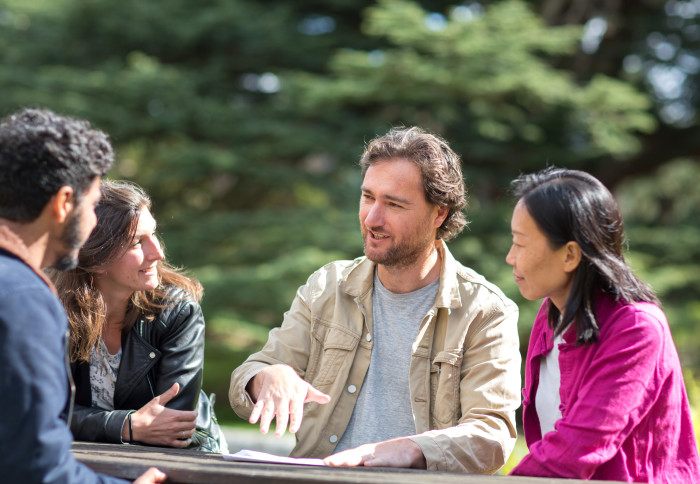International recognition for Imperial ecologist
by Daniel Mapp

Professor Rob Ewers with members of his research group
Professor Robert Ewers receives the NOMIS Distinguished Scientist and Scholar Award, for his pioneering work on rainforest ecosystems.
The prestigious award is made by the NOMIS Foundation, a Swiss foundation that supports and enables insight-driven science across all disciplines, focusing on researchers who put forth bold new ideas, exhibit a pioneering spirit, and seek to inspire the world around them.
Professor Ewers will use his award to bring together a team of Imperial scientists to build the world’s most complex computer simulation of a rainforest, to provide new and fundamental insights into ecosystem resilience.
The virtual rainforest will replicate all the living and environmental components of a forest ecosystem, from plant and animal life, down to natural processes such as the circulation of water and nutrients. The simulation, which is expected to be the most complex ever to have been attempted, will track the birth, growth, reproduction and death of every plant, animal and soil microbe that make up a rainforest.
By creating a virtual rainforest, researchers hope to answer questions that are difficult, or impossible, to address through observational studies carried out in real rainforests. The project is designed to provide new insights into what factors influence the resilience, stability and sustainability of forest ecosystems when they are put under pressure from human activity.
Although scientists have an increasingly detailed picture of the various individual components that make up rainforest ecosystems – such as rainfall, temperature, plant and animal populations, and so on – understanding how these interact together as a whole system is much more challenging.
“Understanding the emergent features of a forest – how stable it is as a system, or how resilient it is to external pressure – is not possible through direct observation alone,” says Professor Ewers. “For example, the SAFE Project is one of the most comprehensive assessments of a forest system ever, yet in one sense it boils down to a series of snapshots of individual ecosystem components, whether that’s one particular plant or animal species, soil nutrient levels, or temperature variation. That’s all vital information, but it can only ever provide hints about the state of the forest as a system, and how it operates in its entirety.”
‘Emergence’ is a term that researchers use to refer to features of a system that cannot be fully explained by its component parts. The stability, resilience or sustainability of a forest ecosystem, for example, are emergent features of a forest ecosystem; they are not directly attributable to its component parts, but rather to how these interact as a whole system. The virtual rainforest will be designed to give insight into emergent features.
Professor Ewers and his team will carry out a number of virtual experiments within the virtual rainforest. One aim is to determine whether the stability of a forest ecosystem is governed by those ecological components that are most heavily interconnected. For example, species that connect different strata of the forest, such as the ground and the canopy, may help stabilise the system in ways that species restricted to just one or other of those strata are unable to. Researchers will also look at how external pressures on forests, such as those arising from climate change, are diluted as they cascade through an ecosystem.
The project will also look at the extent to which rainforests can continue to deliver ecosystem services (the benefits people derive from ecosystems) in the face of global environmental changes. More than 1.6 billion people worldwide are estimated to rely on forest resources for their livelihood, yet more than one half of all tropical forests have already been logged. By testing different forest management strategies in the virtual forest, Professor Ewers and colleagues will provide evidence to help scientists and policymakers to design effective responses to real-world problems, such as how to support the recovery of degraded tropical forests.
“Much research in ecology focuses on unpicking ever more detail about the actions of individual ecosystem components. With the virtual rainforest project, we want to focus on the bigger picture, and to pioneer a holistic, systems approach. This work is truly ground-breaking and we are incredibly grateful to be partnering with the NOMIS Foundation for their support.”
Markus Reinhard, managing director of NOMIS, said, “It is paramount to advance and accelerate our fundamental understanding of the conditions that affect the nonlinear dynamics of complex ecosystems such as rainforests. For instance, growing evidence suggests that we are approaching a level of impact in the Amazon that could shift the system from rainforest to dry savannah, a shift with global consequences. It is an honour for us to present Professor Ewers with the 2021 NOMIS Distinguished Scientist and Scholar Award and to support him and Imperial’s multidisciplinary team in such a pioneering discovery journey.”
Article text (excluding photos or graphics) © Imperial College London.
Photos and graphics subject to third party copyright used with permission or © Imperial College London.
Reporter
Daniel Mapp
Advancement